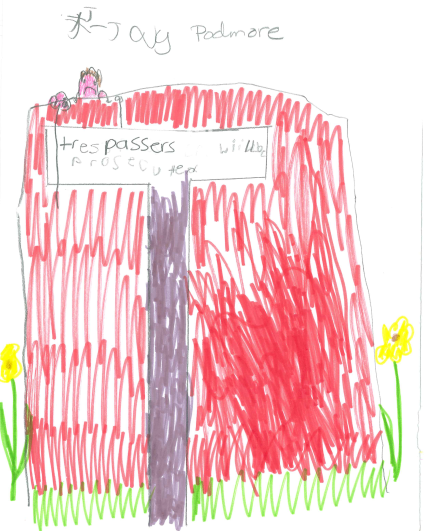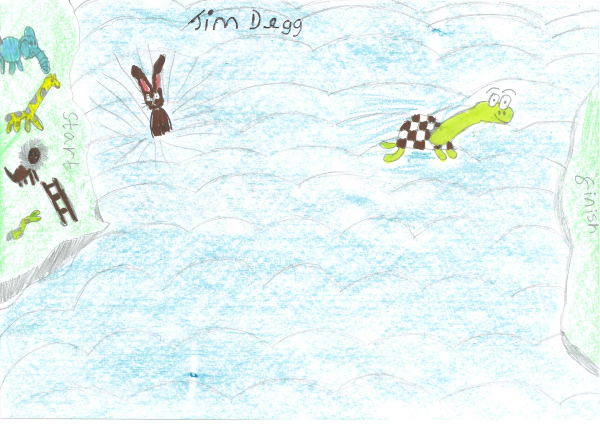- Latest NewsUp-to-date articles giving you information on best practice and policy changes.
- Skills AuditsEvaluate your skills and knowledge, identify gaps and determine training needs.
Dyslexia: activities to raise awareness
Use these activities to raise awareness of dyslexia across the school so that pupils can feel supported and flourish
Activities
- Understanding and empathy: what it's like to be affected by dyslexia
- Trespassers will be prosecuted: activity to promote discussion
- Hare and turtle: activity to promote discussion
- Dyslexia is a gift: successful people with dyslexia
Download this article to raise awareness of dyslexia in your school
The following activities were designed as assembly materials for Dyslexia Awareness Week.
However, they could equally well be used throughout the year to keep the importance of respecting difference at the forefront of people’s minds. Or they could be incorporated into a wider initiative designed to earn the school a dyslexia-friendly quality mark from the British Dyslexia Association.
- The activities can be used in any order and with any age group.
- The two stories are aimed at younger children but could be adapted to make them age-appropriate for older pupils. (Many thanks to some of the children who attend the Staffordshire Specialist Support Centre for the colourful illustrations.)
- The examples of famous people with dyslexia who achieved great things are just a few of many.
- Celebrity profiles could be supplemented by contributions from staff or pupils with dyslexia who have positive experiences they are willing to share.
Understanding and empathy
The secondary school assembly invites students to consider what it is like to be affected by dyslexia, and so encourages empathy within the learning community.
Participants
Someone to set the scene, a reader, and two actors (a student and a teacher).
Resources
A small whiteboard or large notepad, and a marker pen.
Script
Scene-setter: This is a true story. Only the names have been changed. Let’s call the student Phil.
Reader: I remember my first ever spelling test at school.
[Actors enter. Teacher gives the whiteboard/notepad and pen to the student. The actors then mime the action as the reader narrates. The intention is to create pathos rather than humour.]
Reader: The teacher asked me to spell the first word. The word was ‘spelling’. I thought very carefully and wrote the word down: ‘S E L I N G’, then I showed the word to the teacher.
[Student displays whiteboard/notepad to the whole assembly group.]
Reader: He was furious and marched me to the front of the class. He made me write out the word with a correctly formed P and two Ls in the middle on the board. He made me write the word 100 times.
[Student mimes writing on a board very slowly and precisely multiple times.]
Reader: It took me a long time because I had to copy out his correct version very carefully. But I managed to get it right. Then he told me to return to my place and continue with the spelling test. The teacher gave me the next word in the test. It was ‘spelling’ again. I thought very carefully and wrote the word down: ‘S E L I N G’.
[Student displays whiteboard/notepad to the whole assembly group.]
Reader: The teacher was furious once more, but I didn’t understand why. He marched me to the front of the class, made me write it out again… and again… and again… ‘Now go back to your seat!’ he thundered. ‘I will see you again on Thursday night in detention.’
[Pause]
Reader: I didn’t come back to school the next day. In fact, I played truant for six weeks until my parents moved me to another school.
[Pause]
Reader: The teacher’s name was Mr. Goodfellow.
Trespassers will be prosecuted

Read the story
Every afternoon as a group of children came home from school, they would stop and play in a large garden that looked like a park. It had soft green grass, beautiful flowers and peach trees. No one ever seemed to come and pick the peaches, so the children and their parents would take them home to eat.
One day, the owner of the garden came home after a long holiday and saw children playing in his garden and their parents eating peaches.
He ran out to the garden and shouted at all the children and parents to go away and never come back. The next day, he built a high fence round the garden and put up a big sign saying: ‘Trespassers will be prosecuted.’
Now, the children had nowhere to play. Their parents always hurried them past, too frightened to look at the garden because they didn’t want to be shouted at again.
One boy hadn’t been there on that day and didn’t know what the man had said. He looked at the sign but didn’t recognise the words. He tried to work them out by breaking them down into sounds he knew, just as his teacher had told him to. He found this very difficult and thought the sign said: ‘Treasure will be presents.’ Excitedly, he went into the garden to look for treasure.
 The boy was surprised to find no one there. He started to look around. From the house, the owner saw him and was very angry. He rushed into the garden and shouted: ‘What are you doing in my garden? Didn’t you read my sign?’
The boy was surprised to find no one there. He started to look around. From the house, the owner saw him and was very angry. He rushed into the garden and shouted: ‘What are you doing in my garden? Didn’t you read my sign?’
The boy started to cry, as he was scared and confused. He looked up at the owner and said: ‘I’m looking for the treasure and the presents.’
The owner stopped. He looked at the sign, he looked at the boy, and he started to think…
Discuss
- What was the owner thinking?
- If you were the owner, what would you have done?
- How could he make a better sign?
- What do you think the owner should do next?
- How could the owner help the boy?
Hare and turtle
Read the story
Hare often came to the riverbank. He loved to boast about how fast he could run. He was always asking the other animals to race him.
One day Turtle was so fed up of Hare boasting, he challenged him to a race. Hare wanted to race on land. Turtle wanted to race in water. The other animals decided there should be two races, one on land and one in the water.
News soon spread through the forest that Hare and Turtle were going to have a race. Hare told everyone he was going to win.
A huge crowd of animals gathered for the first race through the forest. Hare raced off and Turtle crawled along behind him. As Hare expected, he won the race. For the next few days Hare boasted that he was the fastest animal in the forest.
The day of the river race soon arrived. Again all the animals had gathered to watch the race. This time Hare struggled to take his place at the start line. He asked for a ladder to help him down to the river. He climbed down and he fell into the water with a SPLASH!
‘Help!’ Hare cried…
 Discuss
Discuss
- What do you think happened next?
- Who do you think won the race?
- Why did Hare need the ladder?
- How do you think Hare felt?
- How do you think Turtle felt?
- What are you good at?
- What do you find difficult?
- We are all good at different things so should celebrate our differences and help each other.
- Do you think Hare and Turtle can still be friends?
Take five
Short activities to make spelling more fun and give pupils pause for thought.
Take one
Set the challenge of trying to spell an unusual word, such as a lesser-known capital city, or the Latin name for a common plant. Discuss ways of learning to read and spell new words, and undertake a survey across the class about which method(s) were used. Consider the different types of memory strategies which were needed to complete this.
Take two
Ask pupils to choose five words which they find difficult or tricky to spell. Create a sorting activity based on these words in which the words are created in different fonts, colours and sizes. Organise teams of pupils and get them to race each other to find specific words.
Take three
Use any set of words which could be sequenced, for example, the days of the week. Mix up some letters in one set of words and create another set where the spellings are correct. Jumble the two sets up and see how quickly pupils can sequence the words that are correctly spelled.
Take four
Introduce a game, such as Sparkle, which is based purely on chance. Ask pupils to stand in a circle and give each person a list of five words. Choose one of the words from the list and ask each child, in turn, to say one letter until the word is completed.
The pupil who says the final letter of the word is ‘sparkled out’ and sits out. Continue until only one pupil is left.
Take five
Ask pupils to choose one word and estimate how many times they think they can write it in one minute, two minutes and five minutes. Set the timer for one minute. Did they guess correctly? Repeat for two minutes, and finally for five minutes.
Dyslexia is a gift
Although dyslexia affects about 10% of the population, research shows that some 20% of the UK’s most successful entrepreneurs have the condition. Surprising? Not really. People with dyslexia may be terrible at spelling, but many of them are innovative thinkers, possess outstanding oral skills and have bags of creativity.
People with dyslexia excel in all walks of life
Business
‘When someone sends me a written proposal, rather than dwelling on detailed facts and figures, I find that my imagination grasps and expands on what I read.’ Richard Branson
Literature
‘Writing and spelling were always terribly difficult for me. My letters were without originality. I was... an extraordinarily bad speller and have remained so.’ Agatha Christie
Politics
He was regularly punished in school for failure and lack of effort, sometimes failing the same class numerous times. Winston Churchhill
Science
A teacher sent a note home when he was six: ‘He is too stupid to learn.’ Thomas Edison, inventor of the light bulb, the phonograph, the motion picture camera and more.
Entertainment
The only way he can learn his lines is by listening to them on tape. Tom Cruise
Difficult school days
Celebrity chef Jamie Oliver is worth around £35 million and has sold over 37 million books in 36 languages. Yet the first time he read a whole book right through to the end was at the age of 38.
Talking to journalists on the set of Jamie and Jimmy’s Friday Night Feast, which he co-hosts with his childhood friend Jimmy Doherty, he described his schooldays as follows.
‘While we were at school, I struggled. Imagine a boys’ school. Thirty boys in the middle of English, bang bang bang on the door: “Can we have Jimmy and Jamie for special needs?" Just us two out of our class.'
He went on to explain that this was the cue for the other children to start singing ‘special needs’ to the tune of Let it Be as the pair left the room.
Would that ever happen in your school?
This article is taken from Special Children Magazine, issue 229. PDF versions of the magazines are available to download in the My Account area under My Magazines for Standard, Premium and Unlimited CPD subscribers.
Last Updated:
31 Oct 2022


